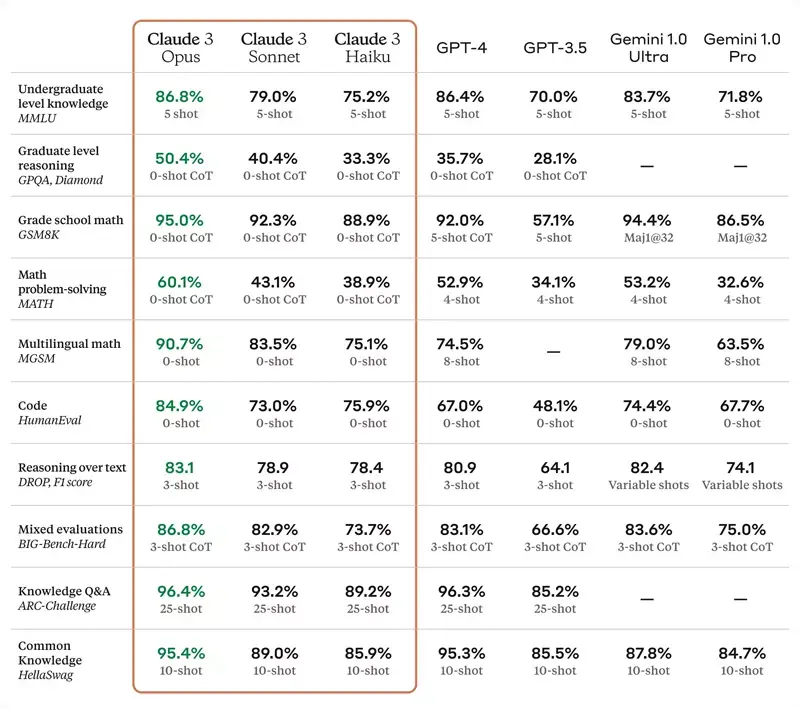Opus by Anthropic

An LLM model with super-powerful capabilities, capable of performing all kinds of tasks with a high performance score. Available with Claude 3
Opus by Anthropic: A Powerful LLM for Diverse Applications
Opus, Anthropic's latest large language model (LLM), represents a significant advancement in AI capabilities. Built upon the foundation of Claude 3, Opus boasts superior performance across a wide range of tasks, making it a versatile tool for both individuals and businesses. This article explores Opus's functionalities, features, applications, and how it stacks up against competitors.
What Opus Does
Opus is a powerful LLM designed to handle a diverse array of complex tasks with exceptional accuracy and efficiency. Unlike simpler chatbots, Opus leverages its advanced architecture to understand context, nuance, and subtle meaning within prompts. This allows it to generate high-quality outputs for a variety of applications, including:
- Text generation: Crafting compelling narratives, writing different creative text formats (poems, code, scripts, musical pieces, email, letters, etc.), summarizing lengthy documents, and translating languages.
- Question answering: Providing comprehensive and accurate answers to complex questions, drawing upon its vast knowledge base.
- Code generation and debugging: Assisting developers in writing, debugging, and optimizing code across multiple programming languages.
- Data analysis: Processing and interpreting large datasets, extracting meaningful insights, and generating reports.
Main Features and Benefits
Opus's key strengths lie in its:
- Superior Performance: Benchmarked against leading LLMs, Opus demonstrates consistently higher accuracy and performance scores across numerous tasks.
- Contextual Understanding: Its advanced architecture allows for a deeper understanding of context and nuance, leading to more relevant and insightful responses.
- Versatility: The model's capabilities extend across a wide spectrum of applications, making it a highly adaptable tool.
- Ease of Use: While technically powerful, Opus is designed with user-friendliness in mind, making it accessible to both technical and non-technical users.
- Integration with Claude 3: Leverages the robust infrastructure and capabilities of Claude 3 for enhanced performance and scalability.
Use Cases and Applications
The versatility of Opus makes it suitable for a broad range of applications, including:
- Business: Market research, content creation, customer service automation, data analysis, and internal knowledge management.
- Education: Personalized learning experiences, automated essay grading, and research assistance.
- Software Development: Code generation, debugging, and documentation.
- Creative Industries: Content generation for marketing, writing scripts, and generating creative text formats.
- Research: Data analysis, hypothesis generation, and literature review.
Comparison to Similar Tools
Opus distinguishes itself from competitors like GPT-4 and Bard through its focus on performance and accuracy across a wider variety of tasks. While direct performance comparisons require independent benchmarking, user feedback and internal testing suggest Opus delivers superior results in complex scenarios demanding deep contextual understanding. However, the optimal choice between LLMs ultimately depends on the specific requirements of the task and the user's preferences.
Pricing Information
Opus follows a freemium pricing model. While basic access to core features is available for free, more extensive usage and access to advanced features likely require a paid subscription. Specific pricing details are available on Anthropic's official website. The freemium model allows users to explore Opus's capabilities before committing to a paid subscription, making it accessible to a wider audience.
Conclusion
Opus represents a significant leap forward in LLM technology. Its superior performance, versatility, and user-friendly interface make it a powerful tool for a wide range of applications across various industries. The freemium pricing model allows for easy exploration and adoption, positioning Opus as a compelling option for both individuals and businesses seeking to leverage the power of advanced AI.